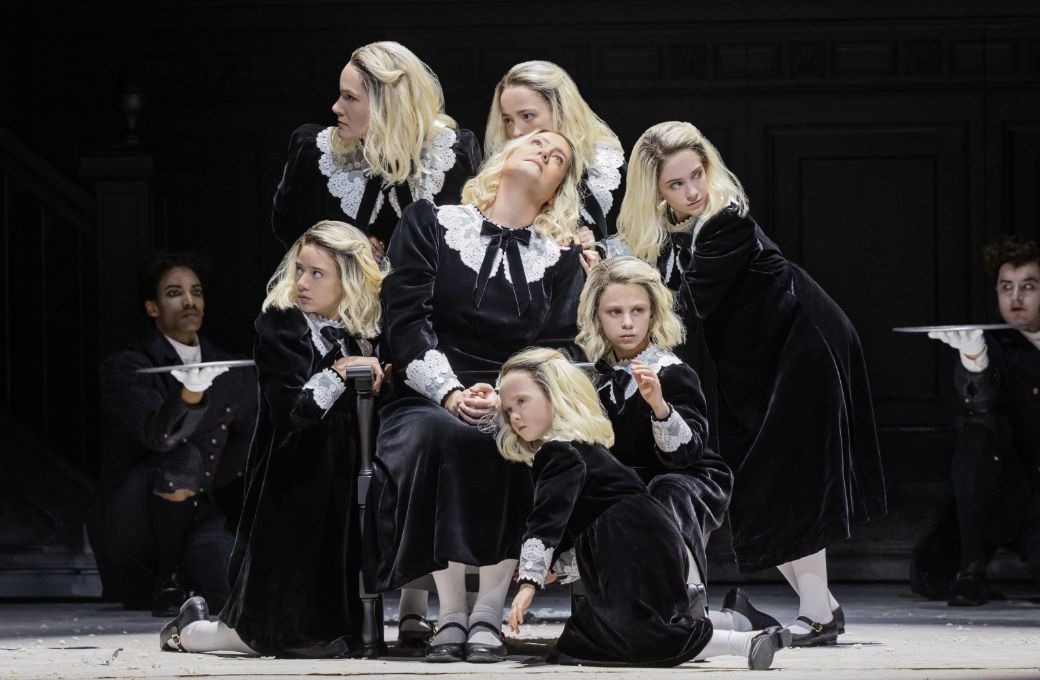When one first meets the eponymous heroine of Richard Strauss’ 1905 opera Salome, based on Oscar Wilde's play, it is in medias res; the only thing we know is that the young captain Narraboth finds her particularly beautiful. Within ten minutes of her entrance, we realize that this 16-year old princess is morally corrupt, oversexed, cruel, spoiled and probably a sociopath. How could this have happened, even within the lascivious court of King Herod?

Claus Guth's new production at the Metropolitan Opera, originally seen at the Bolshoi in 2021, answers that question. The director moves the action from biblical Judea to the era of the opera's composition. In the moments prior to the opening, slithery upward scale on the clarinet, we hear the tinkling of a toy music-box, see a projection of a young girl dancing, and spot a little girl – maybe 7 or 8 years old – sitting on the floor playing with a doll. She tears off one of the doll’s arms and then the other before bashing the doll to smithereens.
The opera begins and we see that designer Étienne Pluss has given us a huge, almost all-black Victorian mansion, with many hidden doors, lackeys in black livery and an over-riding feeling of concupiscence, with men wearing ram’s heads cavorting with naked women on the set’s upper level. The lighting is sickly dark. Steam – or smoke – rises from the floor. Olaf Freese's lighting occasionally makes the mansion's walls seem as if they are closing in, a marvelous effect. Salome enters, wearing the same black dress with starched white collar as the little girl with the doll. Throughout the opera, Guth presents six other Salomes, all dressed alike, ranging in age from, probably, five to fifteen. What starts out as gimmicky soon becomes creepy and eerie when we see that throughout her childhood, and up to the present, this Salome has been abused. We are clearly in Freud’s neighborhood and we understand how a creature such as the Salome of Strauss’ opera could have been created.
When she descends to the basement where the gaunt, chalky-white John the Baptist (Jochanaan) is chained to a wall, we find one of the younger Salomes perched sadly on a ledge and another sitting miserably astride a hobby horse; all of grown-up Salome’s sickly memories and memorabilia are here. The sight of Jochanaan awakens her lust and she then focuses only on him. Her salvation and her downfall? The famous Dance of the Seven Veils is not the usual striptease here. Each of the child Salomes come out wearing a single black veil which is taken from her by the older Salome. Each begins to dance at the behest of a cruel, switch-wielding Herod, wearing a ram’s head, and each in turn is molested by him. It is deeply disturbing. This works as brilliantly as it does due to the Met's superbly committed cast.
Elza van den Heever, who possesses a silvery edge to her highly placed soprano, sailed through the role’s difficulties with ease, believable from start to finish. She tiptoed early on like a naughty girl, and her petulance, which became more and more treacherous, grew organically. If some of the lower reaches of her voice didn’t make it through the mammoth orchestral fiber at first, well, who cares; the opera’s final 15 minutes, when she caresses and finally kisses Jochanaan’s severed head, was an exquisitely deranged peroration.
Jochanaan was luxuriously sung by Swedish baritone Peter Mattei, and his unique, resin-like sound was ideal for his pronouncements and curses. His presence, too, is gigantic. Gerhard Siegel, in the ugly role of Herod, sang every note without faking (a rarity in this role); he was monstrously effective. Michelle DeYoung’s Herodias, all dolled up in an orange dress with orange hair and an endlessly refilled wine glass in her hand, was not in grand voice, but the role really calls for ambient nastiness, which she projected. The small but pivotal role of Narraboth who, under Guth’s direction, is almost molested by Salome, was vividly sung and acted by Piotr Buszewski.
This may be the finest work I’ve heard from conductor Yannick Nézet-Séguin. Strauss’ 100+ piece orchestra must play with grace and ooze charm in some passages, particularly near the opera’s start. But it is there to shock as well and the grand explosions were remarkable. As the evening went on, Nézet-Séguin emphasized more and more Strauss’ ghastly dissonances, becoming more and more degenerate; the final chords were punishing, signs of both Salome’s orgasm and death. The roar that came from the audience at the finale was almost the same.


